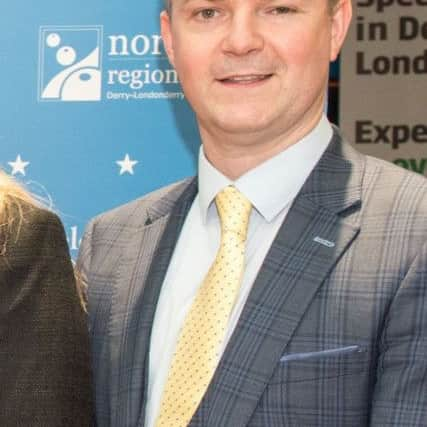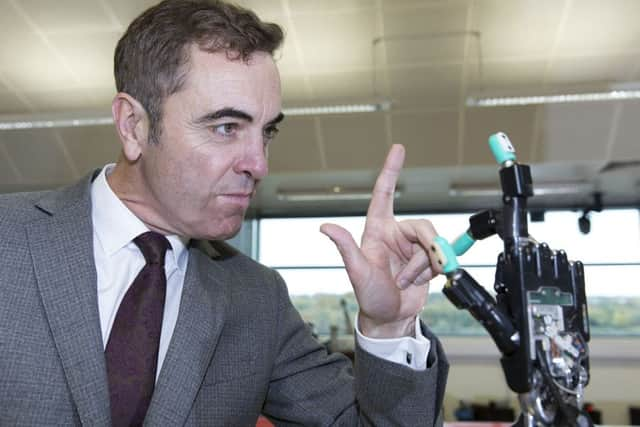Magee Provost understands and shares frustration over expansion


Professor O’Neill was speaking as he and a host of experts from the university unveiled plans to develop globally significant projects they hope to expand with some of the investment promised to Derry under the City Deal.
They said the range of groundbreaking projects would help create jobs and investment in cutting edge industries here, support businesses in the north west and help grow the economy.
Advertisement
Hide AdAdvertisement
Hide AdThe presentation was delivered after Derry City & Strabane District Council’s Chief Executive John Kelpie delivered an update on progress with the City Deal before the Governance and Strategic Planning Committee meeting on Tuesday.


It came after the Council received a letter from the head of the Northern Ireland Civil Service David Sterling which stated that they would be unable to make decisions on funding the project without Ministers in place.
Mr Sterling wrote: “The University is not proposing to finance the Magee medical school from within its own resources, and significant ongoing funding will be required from Government if this is to proceed.
“As you are aware, all public services are under severe budgetary pressure and we simply cannot spend money we do not have. That is one of the reasons we have always encouraged the University to be realistic about the timescales for the project.”
Advertisement
Hide AdAdvertisement
Hide AdThe Medical School is a key tenet of the City Deal plans along with a range of other projects being developed at Magee.


Mr Kelpie told the committee that the UK government earlier this year announced £105m for the city and district, comprised of a £50 City Deal and £55m Future Fund.
Mr Kelpie said that the Council were working on the assumption that the investment will be matched by the NI government but cautioned that the NI Civil Service had advised that they could not currently authorise the additional monies. He said if approved, this will bring the funding pot to £210m, with the Council also expected to invest, while talks are also ongoing with third parties including Ulster University and the Irish government over potential additional regional investment.
The overall objective, Mr Kelpie said, was to achieve a funding pot of £250m to £300m.
Advertisement
Hide AdAdvertisement
Hide AdHe said a key issue was that the vast majority of government funding was for capital projects only.
Making reference to a letter received from the head of the Civil Service David Sterling over the summer recess, Mr Kelpie said he would suggest there were significant areas of concerns over the number of hurdles that are required to be overcome to get the Graduate Entry Medical School over the line.
Prof. O’Neill said they had been closely engaged with the Councillors and Council officers and said that alongside the Medical School there were three other significant projects based on international research and developed over a sustained period at Magee which they hoped to advance as part of the City Deal/Future Fund transformation.
He said a “huge amount of work, a huge amount of thought” has gone in to getting these projects to the stage they were now at, with millions of pounds already invested by the university and millions more in the pipeline.
‘transformational’
Advertisement
Hide AdAdvertisement
Hide AdProf O’Neill said: “These investments as part of the City Deal are absolutely transformational, not just for campus and for the city, they are internally globally significant projects. This is certainly an exciting opportunity for us at the university, for the city and in enabling us to cross the line to become a university city.”
Prof O’Neill pointed out that Magee was a great place to learn with student satisfaction being exceptionally high at over 90%.
Sinn Féin councillor Mickey Cooper said that the projects detailed in the presentation were “major, major projects that really have been under the radar for the vast majority of people in this city”.
He said that the City Deal provided the opportunity to lever in finance to get a lot of these projects of the ground.
Advertisement
Hide AdAdvertisement
Hide AdColr. Cooper said as a Magee graduate, he believed the development of the campus was the key to changing Derry’s economic fortunes. He claimed that there were “mixed messages” in relation to the Medical School, adding: “From our perspective that needs to be absolutely nailed. Further delays are unacceptable.”
SDLP councillor Sinead McLaughlin welcomed that the three projects were embedded and aligned to industrial needs, but added that it has been clear the Civil Service would not sign off on the fourth element, the Medical School in the absence of Ministers.
Addressing those from Ulster University, she said: “We need a Plan B in order to break the stalemate. What can UU do to get this project moving?
“I am mindful this was only a small part- where have the rest of the expansion plans gone?”
Advertisement
Hide AdAdvertisement
Hide AdCalling on the university to ensure Derry is chosen as the location for UU’s School of Health Sciences which it moves from Jordanstown, Colr. McLaughlin pointed out that the Nursing School in Derry is oversubscribed every single year.”
She said the University should “put their money where their mouth is and put those courses into the city without further delay”.
She added: “We have lost a bit of confidence in the university’s ability to deliver. We can’t wait.”
The University said that in relation to the relocation of courses at Jordanstown, nothing has been ruled in and nothing has been ruled out as yet.
Advertisement
Hide AdAdvertisement
Hide AdProf O’Neill said the University was incredibly proud of the Nursing School at Magee and that its success has justified expansion to date, which he said had included a range of courses and new facilities such as the Teaching Block and a Competency Centre- one of only three in these islands.
People Before Profit councillor Shaun Harkin said that recently the Council had voted to put all options for university provision and expansion on the table. Referencing the 50 year campaign to expand Magee, he said the Derry University Group had put it very well when they described those delays as the Christmas gift that was always promised but never arrived. He said that there were alternative options to expanding university provision in the city.
“I don’t think there is a degree of expectation in Derry, I think what exists in Derry is cynicism about promises Magee is going to expand,” he said.
While expressing disappointment at the letter from Mr Sterling, DUP councillor Hilary McClintock said the presentation had been very informative and described the projects as preparations to help turn the city into a ‘global leader’. “One of the good things is that this Council has never been found wanting. Whatever our political differences, we all have all been behind the expansion of the university,” she said.
‘Promises after promises’
Advertisement
Hide AdAdvertisement
Hide AdIndependent councillor Paul Gallagher also addressed the delays into the Magee expansion. He said that “if that data was analysed it wouldn’t look too well”.
He said “promises after promises after promises” had come to nothing as courses were moved to Belfast. “We have seen a brain drain, courses getting cut.”
He claimed: “I get the sense this nearly looks like a ‘smash and grab’. A lot of these projects would be easily shifted. Is the leadership of this city walking around getting led by the hand by an organisation that has failed this city for 50 years?
“We as a Council need to sit down and look at Plan B and that may be a different provider altogether because the reputation of the university in this city is way, way down the line. Seeing what I have seen here today hasn’t convinced me any different,” Colr. Gallagher added.
Advertisement
Hide AdAdvertisement
Hide AdIndependent councillor Gary Donnelly concurred with the comments about promises that never materialised and said there had been “almost systematic disinvestment almost destroying the integrity of the Derry campus”.
“It doesn’t take a genius or a professor to see what a properly funded university would do for this city and this district when you think of the amount of young people who leave,” he said.
Responding to this comments, Prof O’Neill said many of the criticisms levelled were “fair comment”.
“In many cases we absolutely share your frustration,” he said, adding that the wider issue of the failure to raise the cap on student numbers in Northern Ireland was a major stumbling block to expanding university provision.
Advertisement
Hide AdAdvertisement
Hide Ad“The funding model for higher education is not fit for purpose. It needs to be reexamined,” he said. “We need more student places and we need more student places in Derry. Brain drain? Absolutely.
“There is absolutely a huge sense of frustration and that is entirely understandable... as an honorary Derry man we absolutely want the same thing - a more significant university presence in this city. We absolutely share your determination.”
Cutting edge projects could transform Derry
A hat-trick of projects being developed at Magee would help position Derry as a global centre of research, data and analytics, while also future-proofing local businesses and expanding economic opportunities.
The three projects, CARL (a centre of innovation and excellence in data analytics); CIDRA (robotics and automation) and T-HRIVE (centre of excellence for personalised medicine) are already under development at Magee and along with the Medical School are key elements of the City Deal proposal.
Advertisement
Hide AdAdvertisement
Hide AdAt a meeting in the Guildhall, councillors told that CIDRA “reaches out directly to industry” and helps local businesses ensure they are equipped to make best use of the rapidly evolving and expanding automation, robotics, Artificial Intelligence (AI) and digital technologies.
These technological advancements “over the next number of years will be transformative for all our lives and transformative to a range of sectors, not least manufacturing,” - a sector which employs 25,000 people in the North West, local councillors were told.
“They are critical to allow companies to compete to stay ahead of the competition.”
The CARL (Cognitive Analytics Research Lab) started three years ago, building on a “long legacy of excellent research going on in Magee” at the Intelligence Systems Research Centre at Magee, which the Council was told was a “jewel in the crown of the North West”.
Advertisement
Hide AdAdvertisement
Hide AdA representative from the project told the Council: “We have been doing Artificial Intelligence research in that building for the past 20 years.”
CARL, which has already seen millions of pounds invested by the university, involves taking cutting edge research and applying it to data across sectors such as heathcare, civic society, public policy, energy and advanced manufacturing, and has been developed with input from numerous major employers locally.
“There is a massive increase in the amount of data being created,” the committee was told. “As we go forward everything will be connected through 5G. It’s doubling every year and it just comes to a point where current processes can’t handle it. That’s where bringing AI to data analytics gives us a competitive advantage.
“We want the north west to be a centre for analytics and artificial intelligence” and to create a skilled workforce in this area”.
Advertisement
Hide AdAdvertisement
Hide AdT-HRIVE based in C-TRIC meanwhile focuses on personalised medicine. The committee was told that a significant proportion of prescribed medications do not work on up to half of those prescribed them, resulting in wasting potentially £5,000 on up to 40% of the people treated.
Personalised medicine however uses genetic and other personal information to see what drugs people will best respond to. The committee was told that there were a number of ‘spade-ready projects’ while others were also being developed. These include a Centres for Paediatric Cancer, Neuromuscular Disease, Personalised Medicine, Vascular Medicine and Neuropsychiatric Research.
The second part of the project involves commercial engagement, IT/ Data, health companies partnerships, which could also lead to creation of companies, spin offs and new high value jobs.
T-HRIVE is also planning to establish a community health company modelled on the Credit Union with users being both owners and contributors, so if you contribute their data they will be a shareholder and the dividend can be reinvested in community investment companies.